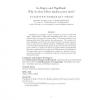Free Online Productivity Tools
i2Speak
i2Symbol
i2OCR
iTex2Img
iWeb2Print
iWeb2Shot
i2Type
iPdf2Split
iPdf2Merge
i2Bopomofo
i2Arabic
i2Style
i2Image
i2PDF
iLatex2Rtf
Sci2ools
IM
2007
2007
In-Degree and PageRank: Why Do They Follow Similar Power Laws?
PageRank is a popularity measure designed by Google to rank Web pages. Experiments confirm that PageRank values obey a power law with the same exponent as In-Degree values. This paper presents a novel mathematical model that explains this phenomenon. The relation between PageRank and In-Degree is modeled through a stochastic equation, which is inspired by the original definition of PageRank, and is analogous to the well-known distributional identity for the busy period in the M/G/1 queue. Further, we employ the theory of regular variation and Tauberian theorems to analytically prove that the tail distributions of PageRank and In-Degree differ only by a multiplicative constant, for which we derive a closed-form expression. Our analytical results are in good agreement with experimental data. Categories and Subject Descriptors H.3.3:[Information Storage and Retrieval]: Information Search and Retrieval– Retrieval models; G.3:[Mathematics of Computing]: Probability and statistics – ...
| Added | 15 Dec 2010 |
| Updated | 15 Dec 2010 |
| Type | Journal |
| Year | 2007 |
| Where | IM |
| Authors | Nelly Litvak, Werner R. W. Scheinhardt, Yana Volkovich |
Comments (0)

